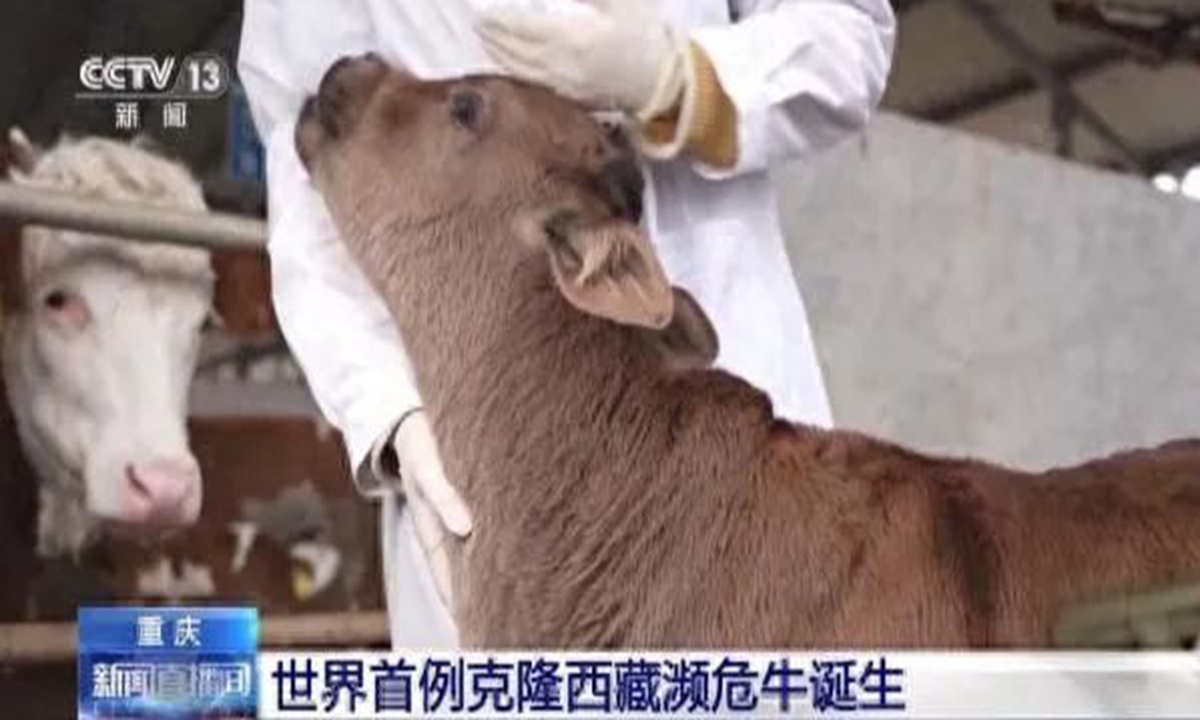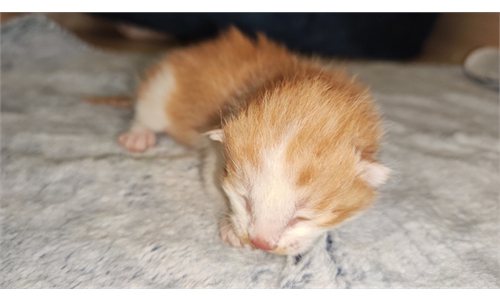
World's first cloned endangered Xizang cattle species born Photo: CCTV News
The world's first cloned endangered Xizang cattle species have been born, the local government in the Southwest China's Xizang Autonomous Region confirmed in a WeChat post on Monday. This is also the first time that cloned cattle were successful delivered in Southwest China.
Recently, endangered cattle breeds Zhangmu cattle and Apeijiaza cattle, found on the Qinghai-Xizang Plateau, have been successfully bred artificially using somatic cell cloning technology.
As Zhangmu cattle and Apeijiaza cattle are rare local breeds of yellow cattle, and are strategic resources for the country to cultivate breeds adapted to high-altitude environments. According to the third national survey and assessment of livestock and poultry genetic resources, there are only 19 Zhangmu cattle and 39 Apeijiaza cattle left, with only one available breeding bull, placing them in a critically endangered state.
Yu Dawei, a researcher from the Beijing institute of animal husbandry and veterinary medicine of Chinese Academy of Agricultural Sciences, said that researchers collected the ear tissue of Zhangmu cattle and Apeijiaza cattle, established a fibroblast cell line after returning to the laboratory, and then used somatic cell nuclear transfer technology to prepare clones embryos.
The cloned embryos were transplanted into surrogate cows, and after full-term pregnancy, we obtained eight cloned cows, Yu said.
Starting from February 2023, Xizang endangered cattle have been undergoing cloning embryo transfers at the Chongqing Beef Cattle Breeding Farm in Yunyang county in Southwest China’s Chongqing. Breaking through the technical challenges of cloning high-altitude cattle breeds, the project team has recently successfully cloned four Zhangmu cattle and four Apeijiaza cattle bulls, ensuring the continuity of the endangered cattle population's bull lineage.
The cloning of cattle in Xizang does not have the necessary conditions. Experts working on cloning technology have chosen Yunyang county, which has a climate and terrain similar to the origin of Zhangmu cattle in Zhangmu town. Additionally, the local area has a cattle breeding farm with strong technical capabilities, ensuring the hardware and software conditions required for cloning.
In 2022, the Ministry of Agriculture and Rural Affairs, the National Animal Husbandry Station, and relevant Xizang departments urgently launched a rescue and protection operation for Zhangmu cattle and Apeijiaza cattle, collected blood samples of the two types of cattle, and completed whole-genome resequencing data collection, and finally achieved the rescue and protection of endangered cattle breeds in Xizang through somatic cell conservation, cloned embryo restoration and other technologies.
Looking ahead, authorities will carry out cloned embryo transplantation of Zhangmu cattle and Apeijiaza cattle in Xizang, combining cloning technology with conventional breeding technology to build a complete genetic system and improve resource protection and utilization system.
Also, there are plans to return two cloned bulls of Zhangmu cattle and two cloned bulls of Apeijiaza cattle to Xizang this summer to meet the urgent need for breeding bulls. The other four will remain in Yunyang to be raised until adulthood, undergo training and conditioning, and have their semen collected and frozen for preservation.
In terms of cloned cattle born in the low-altitude region of Chongqing surviving and adapting when they return to the high-altitude region of Xizang, officials and scientists stated that they are studying and developing appropriate follow-up measures for cloned cattle.
They will gradually acclimatize the cattle by progressing from lower altitudes to higher altitudes, enabling them to gradually adapt to high-altitude living conditions.
The next step involves addressing the challenges of the lack of a production system for cloned cattle in the high-altitude environment.
This will include exploring the cloning of local cows in Xizang to supplement and enrich the genetic lineage of the breeding cattle population. The integration of conventional breeding techniques with cloning technology will be used to establish a comprehensive genetic resource protection and utilization system for cattle in the snowy plateau highlands.


